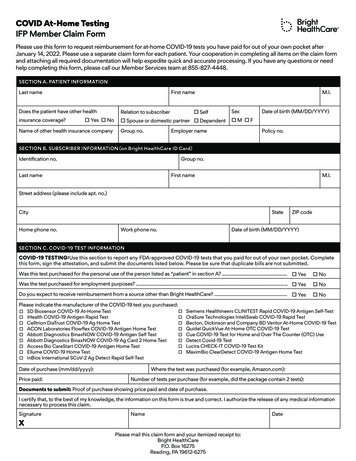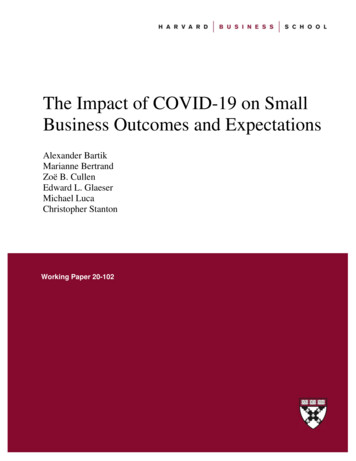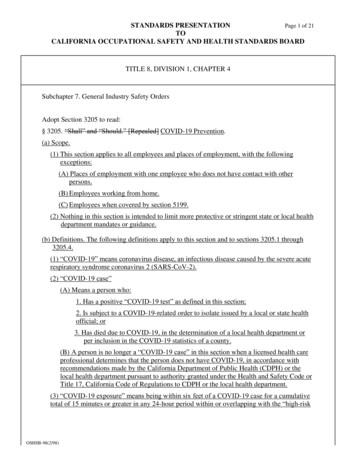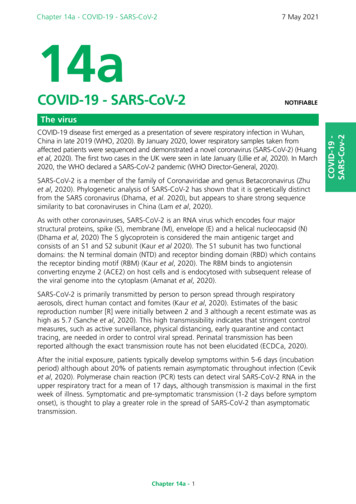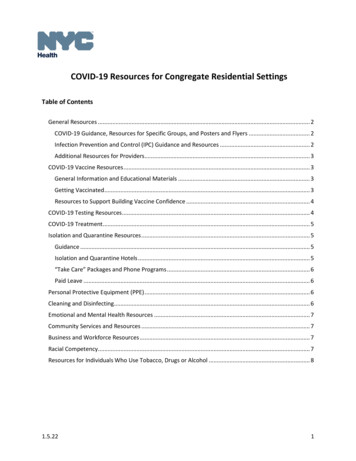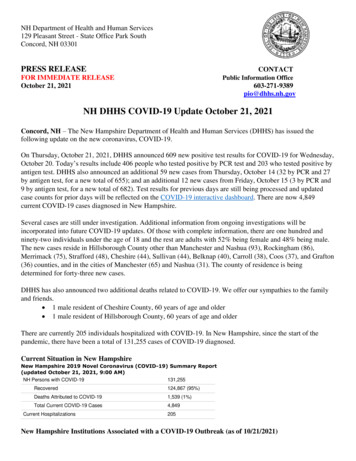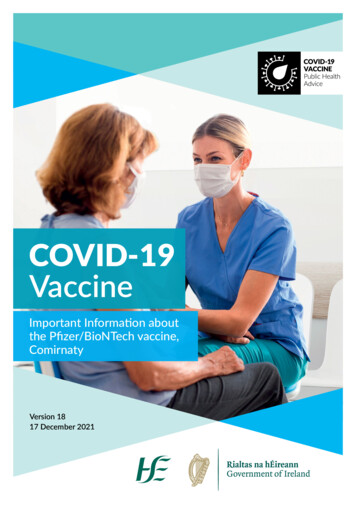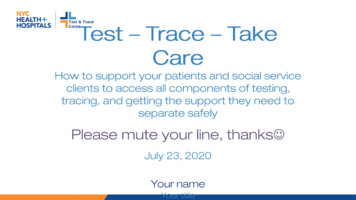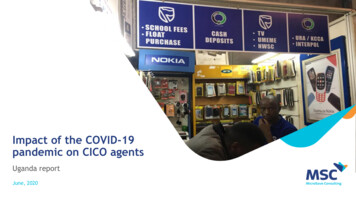
Transcription
Impact of the COVID-19pandemic on CICO agentsUganda reportJune, 2020
CICO agentsduring COVID-19Uganda reportProvides a detailed country-level view of the impact of COVID-19 onCICO agents, their coping strategies, and recommendations forpolicymakers and financial service providers to support themAuthors:Doreen Ahimbisibwe, Anup SinghData analytics:01Recommendations02Impact of COVID-19 on CICO agents03Coping strategies adopted by CICO agentsAakash Mehrotra, Mohak SrivastavaAnnex2All rights reserved. This document is proprietary and confidential.
Uganda01 Recommendations
Immediate measures are needed to boost the incomes of cash-in/cash-out(CICO) agents and reduce expensesBoost income of CICO agentsReduce the burden of expensesKey insightsKey insightsThe income of agents based in both rural and urban areas has reducedsignificantly. This is due to a considerable decline in transactions, onaccount of reduced mobility of customers during the lockdown. Atpresent, customers are only conducting transactions such as the purchaseof airtime.Due to reduced incomes, CICO agents struggle to meet householdexpenses.Rent is the biggest operational cost for these agents, especially forthose who operate from permanent premises. Repayment of loans isanother significant cost for agents.Some agents have begun to use their capital to meet household expenses.Recommendations4Recommendations01The government may consider setting up a relief package to supportagents. For an agent to benefit from this package, they would needto demonstrate financial loss on account of COVID-19.02The government should temporarily remove or reduce taxes onmobile money. This will encourage more people to transact andthus generate much-needed traffic at agent outlets. Currently, atax of 0.5% is levied on all mobile money withdrawals.03Digital financial service providers may step up and provide properrisk management tools for CICO agents. This can include aninsurance cover for loss of life, hospitalization, or both. This willensure business continuity amid the pandemic.01The government may mandate premises owners to provide graceperiods for the payment of rent and waive tax payments for aperiod until the business is able to fully recover.02Banks and other financial service providers may offer a moratoriumin loan repayments. Further, in the recovery phase, financialservice providers may provide a refinancing facility to help agentsrestart their businesses.03Non-dedicated agents suggest a reduction in taxes, which vary frombusiness to business, depending on the size of the enterprise as wellas the products and services. The government may consider atemporary reduction in taxes for micro and small businesses to helpthem recover.All rights reserved. This document is proprietary and confidential.
Adopt changes in the business model as well as precautionary measures toensure the health of agentsThe need for change in the business modelPrecautionary measures to prevent the risk of transmissionKey insightsKey insightsThe agent business model requires agents to have face-to-face interactionswith customers. Client authentication, either through a keypad or logbooks,also requires physical contact. Additionally, agents need to ascertain if thecurrency notes received for cash-in and deposits are genuine.Several agents mentioned not being able to travel to the bank branches torebalance.Recommendations0102035The fear of contracting COVID-19 has forced CICO agents to limit theirinteraction with customers. They are afraid the disease may spreadthrough physical handling of cash.CICO agents did not receive any training on the management ofhealth risks associated with COVID-19.RecommendationsProviders may focus on re-defining business models and processesto ensure the realities of COVID-19 are adequately embedded andaddressed in agency operations. It may require additionalcommissions as well as proactive support on liquidity rebalancingfor at least the next six months.Providers may look at technological interventions that enablealternative modes of authentication. Instead of having to punch in aPIN, authentication can be enabled through contactless one-timepassword (OTP), QR-based transactions, or near-field communication(NFC).Ultimately, however, providers should take a strategic view on howto use the COVID-19 crisis as a catalyst to move towards a moredigital future and set commissions to encourage the exchange ofdigital value in preference to cash-out.010203Provide a set of safety instructions and clear communication on theneed to sanitize biometric devices after each transaction. Banksand financial service providers may also provide essential items,such as masks, sanitizers, and gloves.The service providers should make the guidelines andcommunication material to agents and customers on safetymeasures more user-friendly and easy to understand. MSC’s comicsfor CICO agents in Africa provide an example of the type ofmaterials that can be designed. These comics are being distributedwidely to agents across the continent.Service providers could conduct virtual training to sensitize theagents. In addition, these agents can be provided with materialslike charts on preventing the spread of the disease that can bedisplayed at their outlets.All rights reserved. This document is proprietary and confidential.
02 Impact of COVID-19 on CICOagents
Curfews and lockdowns have significantly affected the agency bankingbusinessThe perception of CICO agents on COVID-19Agents are aware the crisis is still in progress andthe government’s response is evolving and dynamic.Most respondents have no idea how long the crisiswill last while others suspect it will last for 30-60days.Agents understand the impact of COVID-19 on theirhealth and the risks associated with conductingbusiness during the pandemic. They are takingmeasures, at least ones they can afford, to protectthemselves and their customers.The impact of COVID-19 on CICO agentsAgents envision that the way the agency banking business is conducted islikely to evolve as an immediate impact of the pandemic. These changeswill include the evolution of both technology as well as the businessmodel.COVID-19 has affected the income of agents as well as their customers.Even traders and manufacturers that used to conduct large transactionsthrough the agents have suffered losses and hence are not transacting atthese agents.Some CICO agents used to transact on a post-paid basis for some of theirloyal and regular customers. These agents now face non-payment fromtheir customers and have vowed not to conduct transactions on a postpaid basis.“I predict there will only be a few customers when I re-open. Since currency notes have been known to spread the virus, customers stillfear handling cash. They are afraid of visiting crowded places, which is where many agent outlets are located.” – An agent from a semiurban area“I will no longer perform transactions on credit. I used to allow customers to transact even if they were low on cash. I would provide Ithe amount they were short of and they would pay me at the end of the day. I can no longer take such risks due to this situation.”– Anagent from a rural area
CICO agents face twin challenges—reduced income due to lowertransactions and increased expenses of hygiene and safetyReduced income of CICO agentsTransactions have significantly dropped since most customers are currently not working. Withtravel restrictions in place, users can only access agents based around areas near their homes.Hence, agents located away from dense habitation get only a few customers. Most agents arenon-dedicated and run other businesses beside the agency business. If these agents operatefrom shops that sell “non-essential” items, they cannot operate at all.The agents had to modify the opening and closing times of their businesses to comply with thecurfew restrictions. They now work for less than 6 hours, as opposed to 8-10 hours before theoutbreak of COVID-19 in Uganda. A number of agents also had to close their business as thepandemic spread. However, even before closure, these agents witnessed a sharp drop in thenumber of transactions as people became aware of the outbreak and feared the risk ofinfection through cash.Increased expensesAgents incur additionalexpenses to maintain hygieneand safety. These include thecosts of arranging hand wash,masks, and sanitizer, amongothers.The need to use privatevehicles to travel to the bankbranch to rebalance proved tobe an additional expense.“At present, I service not more than five customers each day. The values of these transactions are small, usually between UGX 5,00030,000. (USD 1.4-8.1)” – An agent from a rural area“We are not like salary earners who are guaranteed payment at the end of each month. My average commission used to be around UGX3,000,000 (USD 811). However, this month, I will probably get only UGX 1,000,000 (USD 270) or even less.”– An agent from an urban area
In such trying times, the saving grace is that the technology has been upand runningMarketing and communicationSystem uptimeAgents are able to attract customers to their outlets. This can be attributed to thecommunication and marketing efforts of service providers like banks and mobile networkoperators (MNOs). These service providers market agent banking and mobile money services onvarious channels like the radio and television.Over 95% of the agents have notexperienced any challengesrelated to system downtimeduring this period.Currently, the agents keep in touch with each other and with their customers mostly throughphone calls and WhatsApp. They do not use any other communication channels to support thegrowth of their businesses. This is partly because most of these agents have small businesses.The average commission earned by the agents interviewed is UGX 750,000 (USD 203). Thecreation of a budget for marketing, along with other operational expenses, is thus notfeasible.The agents have been able toconduct their businessesuninterrupted. A few agentsreported cases of where the ITsystem did not respond.However, these were trivialissues that did not last for long.,“I experienced a few instances of fluctuations and had to re-do the transaction. However, largely, the system has been okay.” - An agentfrom a semi-urban area“There have not been any system downtime issues so far.”- An agent from a rural area
03 Coping strategies adoptedby CICO agents
Agents lack measures for business continuity. As a result, they have begun touse their capital for survival or to meet basic needs.Agents are doing whatever it takes to stay in business. Unfortunately, desperation has driven a few to use their working capital tomeet basic needs.Some agents have started working from home. A few even operate from the verandas of their closed shops that were shuttered sincethey sell “non-essential” goods. Some agents endeavor to show up for work even if it is for a few hours. Since the agents have tocomply with the curfew restrictions, their operating hours have reduced from the usual eight or more hours.Agents either exchange float with other agents or wait for customers to transact to get the required cash or float in areas where somere-balancing points have been closed down.Some of the respondents mentioned they supplement their currently low incomes with savings. However, their savings are alsodepleting rapidly.Agents observed a sharp decline in commissions due to fewer and lower value transactions, like airtime purchase and bills payment.These agents have thus resorted to spending a portion of their capital to meet the basic needs of their families.“I cannot watch my family starve. I have decided to use some of my capital to feed them.” – An agent from a rural area“I often receive calls from some of the big traders who used my agent banking services before the lockdown. When they call, I rush tothem and conduct the transactions.”– An agent from a semi-urban area11All rights reserved. This document is proprietary and confidential.
Agents require more support from stakeholders to manage this crisisSupport from stakeholders is critical to ensure business continuity for CICO agents in UgandaAgents have encountered various challenges concerning access to service centers for support during this period. These challengesinclude lack of response to service helplines. Hence, issues from agents as well as customers remain unresolved, which may have longterm impact in terms of trust on mobile money services.Many centers or shops the agents used to visit to re-balance have closed down. As a result, some agents now prefer to wait forcustomers to withdraw or deposit their money to get the required liquidity. However, when they are unable to balance theirtransactions, agents are forced to send some customers away.Respondents have not received any training support on the ways to cope and manage their businesses in the face of a pandemic. A fewtext messages from some of the providers on general health tips are the exception. Agents indicated they would like to receive thefollowing items from service providers:Essential equipment like masks, gloves and sanitizersCharts highlighting the dos and don’ts to curb the spread of COVID-19 that they can display at the outlets“The services have already been interrupted—the shop from which I used to get float is currently closed. Service providers shouldsupport us better.” – An agent from a semi-urban area“I encountered a problem while transacting and needed help. I have been calling the service center for two weeks now but nobodyanswers my calls. It seems that the staff at the service center are not working.”– An agent from an urban area12All rights reserved. This document is proprietary and confidential.
Annexes
Status of CICO agents in UgandaDefinition of CICO agents in Uganda Distribution of CICO agent network across major serviceprovidersA cash-in/cash-out or CICO agent is one that can exchangecash for electronic value, electronic money, or e-money.Agents in Uganda are largely non-exclusive. This means thatan agent can serve more than one service provider and can bea bank agent as well as an MNO agent. 79% of agents work formore than one service provider. There is a shared agent banking platform. According to theAgent Banking Company, (ABC) there are currently over 9,477bank agents on the ABC platform. MTN and Airtel account for 99% of the mobile money market.96% of agents work for MTN and 82% work for Airtel.Name of service providersBank agents 9,000MNO agents 20,000Mobile money market share57%MTN market shareSource: g-grows-to-9477-agents/ and https://bit.ly/2MtflYw14Number of CICO agentsAll rights reserved. This document is proprietary and confidential.42%Airtel market share
Assessing the economic impact of COVID-19 on CICO agentsThe objective of the researchApproachUnderstand and quantify the impact of COVID-19 on businesscorrespondentsInform policy and support subsequent efforts to rebuild the CICO networkAssess the impact of COVID-19 on:o Revenues and costso Business activities and ranges of productso Liquidity managementExplore options to minimize threats and maximize business opportunitiesAssess gender implicationsUnderstand the usage of communication channels and identifyopportunities that can be utilizedUnderstand the role of BC networks and trust and the effects of thepandemic on bothAssess private and public sector support services15Country in focus: UgandaLocation divide: Rural, urban, and semi-urban areasSample size: 15 agentsMethod: Telephonic surveysA qualitative panel of 15 CICO agents wereinterviewed by MSC staff every four weeks for sixmonths.All rights reserved. This document is proprietary and confidential.
Impact of COVID-19 on the revenue or income of agentsImpact on incomeThe income or commission earned has reduced significantly, both inrural and urban areas.Since agents are considered essential service providers, they areallowed to operate. However, business is still low since most of thepopulation is not working and these are the ones who transact atagent points.Down by over 40%Down more than 20% and up to 40%The pie chart shows the impact of the pandemic on in the income ofthe agents“Withdrawals are few. Even when they do come, customerswithdraw minimal amounts of money, usually between UGX20,000-30,000 (USD 5.4-8.1).”- An agent in SorotiAt present, airtime purchase and utility payments are the mostcommon transactions. The handful of deposit and withdrawaltransactions have small values.Agents have witnessed more than a 40% drop in the number ofclients and the value of transactions.“Previously, I used to get 80-90 clients each day. Now, the maximumnumber I get is 35.” - An agent in Hoima
Impact of COVID-19 on business operationsStatus of businessesSeveral agents are non-dedicated and operate their businesses inshops that sell items considered non-essential. As a result, theseagents can no longer operate.Some of the centers or shops the agents used to visit to re-balancebefore the pandemic have closed down. This makes it difficult forthem to operate. These agents now wait for customers to conducttransactions to get the required liquidity. However, agents areforced to send some customers away if they are unable to balancetheir transactions.Very low business-limited activityCompletely locked down“I used to open at 7:00 a.m. and close at 7:00 p.m. Now, Ioperate from 9:00 a.m. to 4:00 p.m.”“The shop where I used to buy float is currently closed.Therefore, services have already been interrupted. I amonly able to work with what I have.”Most agents who still operate had to adjust their opening andclosing times as per the curfew restrictions. They now work forless than 6 hours, as opposed to the usual 8-10 hours beforeCOVID-19.
Support offered by various stakeholdersInstant liquidity measuresGovernmentMNOsSome of the planned interventionsinclude: Tax breaks have been announced forindustries and various businesses,particularly on access to electricityand water for industries, factories,and households. These will enableentrepreneurs to cut down costs anddivert resources to rebuild theirbusinesses. The banks and some MNO shops haveremained open to allow agents toeasily access services during thisperiod. This enables agents tocontinue their business, especiallywhen the need to rebalance arises.FinancialserviceprovidersSource: https://bit.ly/3dwXyeN and https://bit.ly/2AzUSi418Short and long-term creditrelated measures and discountsOther relief and benefits The government has considered providing The government also started foodgrants to private businesses through thesupply to all vulnerable Ugandans.Uganda Development Bank. ManyHowever, not all beneficiaries havebusinesses have lost their incomes duringreceived the intended benefits.this period. A grant would help recapitalize these businesses and will becrucial to ensure business continuity. MTN and Airtel Uganda enhanced their Some MNOs introduced affordablemobile money offers to allow Ugandansbundles like the “work from home”to send any amount of mobile money atbundle. This enables not only agentsno cost for the next 30 days. This movebut also other business owners andintends to minimize physical exchange ofemployees to work from wherever theypaper money. It will allow more digitalare.transactions and might drive more trafficto the agent points. The financial service providers aregranting repayment holidays for amaximum of 12 months, effective 1stApril, 2020. Extension of loan tenors andany other forms of debt restructuring arecovered in the existing regulation. Agentswith outstanding loans will also benefitfrom this.All rights reserved. This document is proprietary and confidential.Commercial banks in Uganda waivedtheir charges on digital and onlinetransactions for 30 days, effectivefrom 25th March, 2020. This will helpagents get more customers throughagent banking services.
MSC is recognized as the world’s local expert in economic, social andfinancial inclusionSome of our partners and clientsInternational financial,social & economic inclusionconsulting firm with 20 years of experience180 staff in 11offices around theworldProjects in 65developing countriesOur impact so far550 clients 850publicationsAssisted development of digitalG2P services used byImplemented875 million people 850 DFS projectsDeveloped275 FI productsand channels now used by55 million people19Trained 9,000 leading FI specialists globallyAll rights reserved. This document is proprietary and confidential.
MSC corporate brochure Contact us at info@microsave.netAsia head officeAfrica head office28/35, Ground Floor, Princeton Business Park,16 Ashok Marg, Lucknow, Uttar Pradesh, India 226001Tel: 91-522-228-8783 Fax: 91-522-406-3773 Email: manoj@microsave.netShelter Afrique House, Mamlaka Road,P.O. Box 76436, Yaya 00508, Nairobi, KenyaTel: 25-420-272-4801 Fax: 25-420-272-0133 Email: anup@microsave.net
loyal and regular customers. These agents now face non-payment from their customers and have vowed not to conduct transactions on a post-paid basis. The impact of COVID-19 on CICO agents "I predict there will only be a few customers when I re-open. Since currency notes have been known to spread the virus, customers still fear handling cash.



